






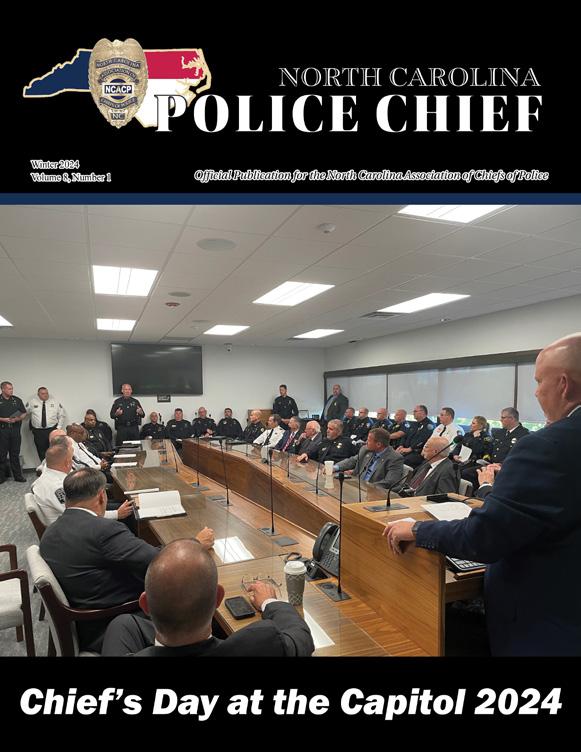


Immediate Past President
Chief Blair Myhand Hendersonville P.D. bmyhand@hvinc.gov
President Lt. Henry King Winston Salem State University kingha@wssu.edu

First Vice President
Director Roger “Chip” Hawley State Bureau of Investigation chip.hawley@ncdps.gov
Second Vice President
Chief Toby Harrison Haw River tharrison@townofhawriver.com
Secretary
Chief Paul Burdette, Jr. Beaufort P.D. p.burdette@beaufortnc.org
Sgt.-At-Arms
Chief Jeremy Dixon Holden Beach P.D. jeremy.dixon@hbtownhall.com


(917) 601-9058

Super China Buffet has been nestled in Greensboro ever since 2007. This cozy establishment highlights our passion for market-fresh ingredients, honest cooking, and an enjoyable atmosphere. Our menu features a wide selection of dishes made in-house by our team of talented chefs. Our buffet offers a smorgasbord of fresh and delicious Chinese cooking, including seafood, chicken, beef, pork, and vegetables. With some of the most delicious combinations of ingredients, there is something for everyone to enjoy. Our staff works tirelessly to ensure the freshness of the buffet food.

Region I
Chief Chris Beddingfield Biltmore Forest P.D. cbeddingfield@biltmoreforest.org
Region II
Chief Reed Baer Hickory P.D. rbaer@hickorync.gov
Region III
Chief Gerald Childress Kings Mountain P.D. gerald.childress@cityofkm.com
Region IV
Chief Bobby Rummage Lexington P.D. rdrummage@lexingtonnc.gov

Region V
Chief Mitch McKinney Mebane P.D. mmckinney@mebanepd.com
Region VI
Chief Ken Klamar Sunset Beach P.D. kklamar@sunsetbeachnc.gov


Region VII
Chief Jason Armstrong Apex P.D. jason.armstrong@apexnc.org
Region VIII
Chief Jimmy Crayton Wallace P.D. jcrayton@wallacenc.gov
Region IX
Chief Orlando Rosario Stantonsburg P.D. chief@stantonsburgpd.com
Region X
Chief Jeff Ackerman Duck P.D. jackerman@townofduck.com




Chief B. L. Porter Mecklenburg Co PD, 1976-77
Chief Robert F. Goodwin Raleigh PD, 1978
Chief Darryl L. Bruesti Wilmington PD, 1979
Chief C.M. Gilstrap Goldsboro PD, 1980
Chief John A. Faircloth High Point PD, 1981
Chief B.J. Hamrick Morganton PD, 1982
Chief Floyd Lucas Hickory PD, 1983
Chief Roger Halbert Jacksonville PD, 1984
Chief C.C. “Buck” Elmore Gastonia PD, 1985
Chief Ronald Hansen Fayetteville PD, 1992
Chief James K. Festerman Reidsville PD, 1993
Chief Vic Orr Mecklenburg Co PD, 1994
Chief Gerald Galloway Southern Pines PD, 1995
Chief John Crone Washington PD, 1996
Chief Jack Conner Spindale PD, 1997
Chief Bob Cansler Concord PD, 1998
Chief Tom Moss Garner PD, 1999
Chief Randall Aragon Lumberton PD, 2000
Chief Don Fisher Laurel Park PD, 2007
Chief John Hodges Hope Mills PD, 2008
Chief Merl Hamilton Concord PD, 2009
Chief Tim Ledford Mint Hill PD, 2010
Chief Pat Norris

Winston Salem State Univ, 2011
Chief Tim Hayworth Zebulon PD, 2012
Chief John Letteney Apex PD, 2013
Chief Tom Adkins Hickory PD, 2014
Chief Bence Hoyle Cornelius PD, 2015
Chief Larry Hesser Hendersonville PD, 1986
Chief Raymond Shelton Burlington PD, 1987
Chief Jerry H. Welch Madison PD, 1988
Chief David Fortson Cary PD, 1989
Chief Joe Puett Mooresville PD, 1990
Chief John Stevens Indian Beach PD, 1991
Chief Greg Harrington Wake Forest PD, 2001
Chief Robert Williams Morganton PD, 2002
Chief Frank Palombo New Bern PD,2003
Chief Larry Murdock Thomasville PD, 2004
Chief Glen Allen Henderson PD, 2005
Chief Tom Younce NC State University PD, 2006
Chief Robert Hassell Reidsville PD, 2016
Chief Mike Yaniero Jacksonville PD, 2017
Chief Brandon Zuidema Garner PD, 2018
Chief Dan House Wrightsville Beach PD, 2019
Chief David Hess Roxboro P.D.
Chief Damon Williams N.C. Central P.D.
















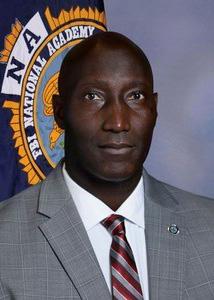
I am extremely and deeply grateful to be the 49th President of the North Carolina Association of Chiefs of Police.
It is exceedingly an honor and a privilege to serve in this capacity, and for that, I want to express my sincere gratitude for the trust you have placed in me.
First, I must acknowledge the outstanding past presidents who have preceded me in this role.
I also must acknowledge our newly elected Board of Directors,

who are very passionate leaders in law enforcement.
My priority as President is to continue to foster cooperation among our police department, elected officials, and the communities that we all serve.
I am well aware of the responsibility that comes with this position, and I pledge to lead with transparency, integrity, and accountability that adhere to the principles that define our noble profession.
Together, we will accomplish the goals to enhance this organization while improving the quality of life for all.






2024 began with our 48th Annual Training Conference in Cherokee. We had a record number of attendees, with 365 registered Chiefs, staff members, and guests. We also saw a variety of Vendors, in which 118 individual companies and businesses had booths in our Exhibit Hall.
We received some great feedback on the training topics and the opportunity to once again meet, network, and train with each other.
This year, the Association has been focusing on Officer Wellness and Performance. We participated in the NCLM City Vision Conference in early April to discuss how Officer Wellness and taking care of our people played a key role in retaining good Officers.
Later that month, we were invited to present at the Research Triangle Institute Policing Symposium on Officer Performance and Wellness. Our NCACP App was upgraded to include Wellness Resource links to be utilized by our Chiefs and agencies. We are sponsoring informational ZOOM Meetings on Health and Wellness with our partners at LexiPol.

Bill Hollingsed
We have also been the recipients of managing an Officer Performance and Wellness Grant. The NC Legislature provided $1.5 million over a two-year period to enable law enforcement agencies across the state to develop and/or strengthen wellness programs for their employees.
“The wellness and safety of law enforcement officers is critical not only to themselves, their colleagues, and their agencies but also to public safety.”
The NCACP is committed to providing resources and information to our Chiefs to help meet the needs of our Officers into the future.
I also want to remember those law enforcement officers in North Carolina that have made the ultimate sacrifice. 2024 has been a tough year in our state regarding the murder of law enforcement officers.
In April, we lost 4 officers in one incident in Charlotte. Several other Officers have been shot throughout North Carolina as well this year. We have also lost Officers due to suicide.
Ensuring that officers return home safely at the end of each
shift is a paramount concern for all law enforcement leaders. The NCACP recognizes that one of the tougher challenges facing any police executive is handling a line-of-duty death within a department.
In addition to providing training in this area, the Association works closely with COPS and other organizations to assist our Chiefs throughout the state when the unthinkable happens.
We are also committed to analyzing trends and continually providing updated training to prevent future line-of-duty deaths and to address Officer wellness.
We are also grateful to RANC, who has provided funding for our Officer Assistance Fund. In 2024, we have provided over $20,000 to Officers and their families to assist them in their time of need. We truly appreciate the our partnership with RANC to allow us to do this.
Providing training is a top priority for the NCACP. Although our 2024 Conference has just ended, we are already working and planning to provide the most up-to-date and useful training available to assist our Chiefs and






our agencies to meet the demands of our profession.
I am proud of the work that your Board of Directors do on a daily basis and for the leadership that is shown to represent our profession throughout the state.
I am also appreciative of Fred Baggett, our Legislative Liaison, for his efforts on behalf of the Association. I also want to thank each of you, as police leaders, for
your commitment and dedication to advancing the ideals and high standards of law enforcement to each of your respective communities. I look forward to working with each of you in the coming year
Sincerely,
Bill Hollingsed NCACP Executive Director
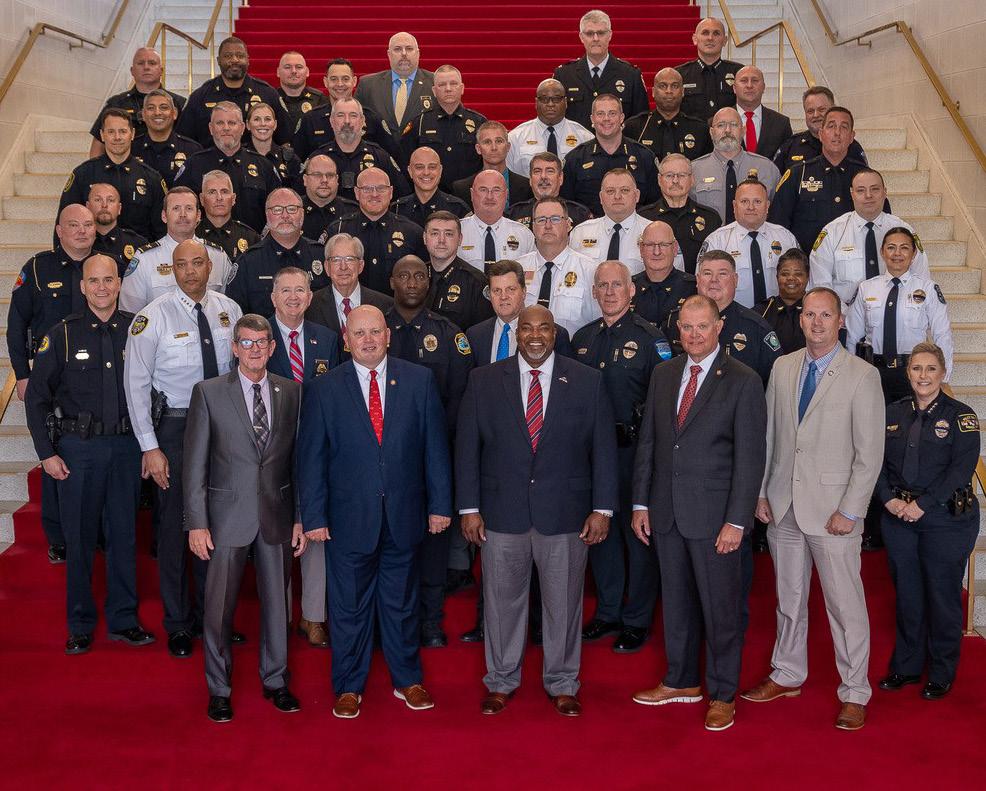







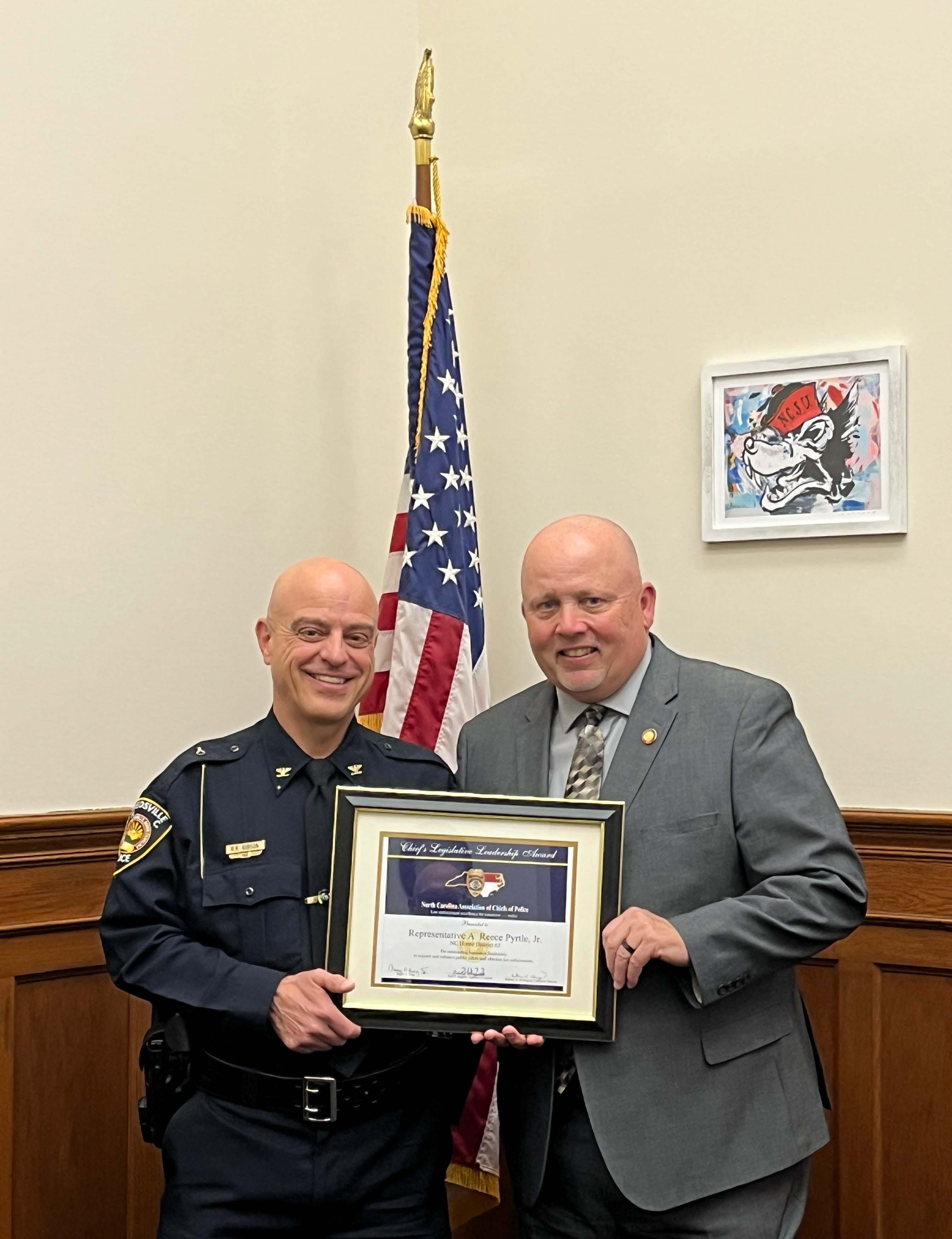






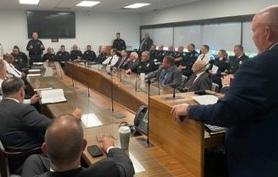
North Talbert
Lexington (336) 276-3003

Cotton Grove Rd
Lexington (336) 237-0657














By Timothy M. Melton, Assistant General Counsel, Retirement Systems Division
Contributing Authors: Patrick Kinlaw, Director of Policy, Planning and Compliance, Retirement Systems Division, Benjamin Garner, General Counsel, 0ffice of State
Treasurer
The Retirement Systems Division {RSD) of the North Carolina Department of State Treasurer {DST) plays a key role in administering the North Carolina Retirement Systems Laws.
Members of the State and Local retirement systems share the cost of funding retirement benefits by contributing six percent of their compensation. Their employers also share this funding cost by making contributions at a significantly higher percentage.
These member and employer contributions, combined with investment earnings on the total contributions, create a foundation for the sustainability of the retirement systems.
The felony forfeiture statutes provided in the Retirement Systems Laws address job-related felonies that employees have committed while in public service.
The statutes penalize such employees by eliminating, or substantially reducing, the pension benefits they would have otherwise accrued from their public service. RSD is responsible for enforcing these felony forfeiture statutes. Unfortunately, we are frequently unaware when members are convicted of job-related felonies under state law.

Currently, there is no standard means by which we can collect data on public servants who are convicted of job-related felonies under state law. We rely heavily on people reporting to us potential forfeiture-related matters through the RSD felony forfeiture mailbox {FForfeitureReporting@nctreasurer.com) or the Fraud, Waste, and Abuse Hotline {1-855-90FRAUD or retfraud@ nctreasurer.com). Beyond that, we are reliant on information observed in the media, which is not a surefire notification process.
Once RSD becomes aware of a potential felony forfeiture matter, our staff are often called upon to track the status of felony charges by accessing the public terminals at the courthouse.
We have also encountered challenges when trying to obtain from various Clerks of Court the documentation needed to determine whether any felony forfeiture laws apply to criminal matters involving state and
local employees. The coronavirus pandemic, combined with agency staffing issues, has made this information-seeking process increasingly difficult.
RSD needs the assistance of the State’s District Attorneys, Assistant District Attorneys, and their staff to ensure the timely application of pertinent felony forfeiture laws.
Even when RSD learns of jobrelated convictions years after the fact, we still must apply the pertinent felony forfeiture laws.
This can cause significant disruption to the lives of those involved. For example, not long ago, we learned of a member who had been convicted of a jobrelated felony under State law in 2014.
The relevant felony forfeiture statute was relatively new at that time and we did not learn of the conviction until we were con-






tacted by a reporter working on a national story.
Unfortunately, the member had already been paid disability benefits for several years and is required to repay those benefits to which the member was not entitled. In addition to the {likely) large burden on the member’s family, this type of situation puts RSD at risk of not being able to collect the substantial overpaid benefits.
If the prosecuting attorney had been aware of the retirement system’s felony forfeiture laws and understood the consequences resulting from the conviction, this situation may have been prevented.
As an example, when the felony forfeiture statutes are applied to a non-elected member of the State or local retirement systems, the member will receive a partial refund of all contributions they made starting December 1, 2012, plus interest. {This assumes they were vested in the retirement system as of December 1, 2012; otherwise, they will receive a refund of all of their contributions, plus interest.)
The member subject to the felony forfeiture statutes will forfeit the employer contributions and investment earnings on total contributions made during this period.
The member might also choose to take a refund of his or her entire account, including those contributions made before December 1, 2012 {instead of keeping the remaining account active but having a substantially reduced and/or delayed retirement benefit).
If the member gets a partial refund or chooses a completed refund of contributions, he or she could potentially receive a sizable lump sum payment, notwithstanding their conviction of one or more applicable felonies.
It may be beneficial for the District Attorney’s office to understand, particularly in situations involving embezzlement, that the defendant might have considerable funds available from a retirement plan distribution that could be applied toward restitution or factor into plea arrangements.
Even if a conviction has not yet occurred, RSD is available to discuss the potential ramifications that could result from applying the felony forfeiture statute. We can have these discussions with the member, with the District Attorney’s office, or both.
The Teachers’ and State Employees’ Retirement System {TSERS), Local Governmental Employees’ Retirement System {LGERS), Consolidated Judicial Retirement System {CJRS), and Legislative Retirement System {LRS) are pension plans administered by RSD.
Each of these plans have separate but similar felony forfeiture laws that apply to elected officials and other members of the State system.
The laws are under G.S. 135- 18.10A and 135-18.10B {TSERS), G.S. 128-38.4 and 128-38.4A{LGERS), G.S. 13556{g) and 135-56{j) {CJRS), and G.S. 120-4.33 and 120-4.33A {LRS).
In all four of these systems,
elected government officials who were not vested on July 1, 2007, will forfeit their right to a monthly benefit if convicted of certain state or federal offenses related to their service as an elected official. Those who were vested on July 1, 2007, are not entitled to creditable service accrued after July 1, 2007.
Non-elected employees who were not vested as of December 1, 2012 and are convicted of a state or federal felony directly related to their employment while in service are prohibited from receiving any retirement benefit other than a return of their contributions plus interest.
Those who were vested as of December 1, 2012, are prohibited from receiving any retirement benefit for service rendered after December 1, 2012, other than a return of their contributions plus interest for the period of service after that date.
The Firefighters’ & Rescue Squad Workers’ Pension Fund {FRSWPF) and Registers of Deeds’ Supplemental Pension Fund {RDSPF) are also administered by RSD and subject to felony forfeiture laws. G.S. 58-86-100, which was effective December 1, 2013, provides that a member who is convicted of a state or federal felony that is directly related to service as a firefighter or rescue squad worker, and brings disrepute on a fire department or rescue squad, is prohibited from receiving any retirement benefit {other than a return of member contributions) if the offense is committed while the member is not yet 55 or has not yet received 20 years of fully creditable service, or while the







member is at least 55 and has 20 years of creditable service but is still serving as a participant of an eligible department or squad.
With respect to registers of deeds, G.S. 161-50.5{d1) provides that, if any portion of a register of deeds’ LGERS benefit is forfeited, then that member’s entire RDSPF benefit is also forfeited.
Documents are Needed to Determine Whether Felony Forfeiture Laws Can be Appled? RSD typically requires the charging, judgment, and sentencing documents to determine whether the felony conviction will result in forfeiture. We may occasionally need additional documentation regarding the precise details and dates of the offense{s) if such
information is not clearly listed in the documents provided. In some cases, the plea transcript may also be necessary.
We at the Department of State Treasurer need your help. We would much appreciate any effort that you can make to notify us of a potential conviction that may result in application of the felony forfeiture statutes.
In fact, simply notifying our office of felony convictions involving state or local government employees would be a big help. The preferred method for reporting potential felony forfeiture matters to RSD is via email to forfeiturereporting@ nctreasurer.com. However, reports can also be made by call ing RSD at 1.855.90FRAUD

{1.855.903.7283) or via email at retfraud@nctreasurer.com. The faster you alert us of potential felony forfeiture matters, the faster it can be processed with minimal disruption to the member’s family and the sustainability of the Retirement Systems




















By Mitch McKinney, Police Chief, Mebane, North Carolina
The Need for Innovative Policing Tools
Modern policing requires more than just traditional methods; it requires a commitment to innovation and community engagement. With increasing scrutiny on law enforcement practices, the ability to engage in meaningful dialogue with the public is more critical than ever.
Photovoice, an innovative technique that combines photography with structured dialogue, offers a powerful way to bridge the gap between law enforcement and the communities we serve.
Understanding Photovoice: A Tool for Modern Policing
Photovoice is a participatory research method that empowers individuals to express their experiences and perspectives through photography.
Participants are provided with cameras and encouraged to capture images that represent their concerns and lived experiences on topics such as race, community engagement, and public safety. These photographs then serve as the foundation for structured dialogues, where participants share the stories behind their images in a safe and inclusive environment.
How Photovoice Transformed my Approach
My introduction to Photovoice came in the spring of 2020, while I was serving as Deputy Po-
lice Chief for the City of Apex. Through our collaboration with Essential Partners, I was introduced to this transformative tool.
The process subtly encouraged our group to engage in challenging conversations in a productive manner. It allowed us to express our viewpoints and actively shape those discussions, fostering understanding, empathy, and stronger relationships—particularly within diverse groups.
One of the most profound moments during this journey occurred when a community member, initially critical of law enforcement, reached out to me and said, “I’m glad I got to do this. I’m glad I got to do this with you.”
This encounter solidified my belief that Photovoice can have
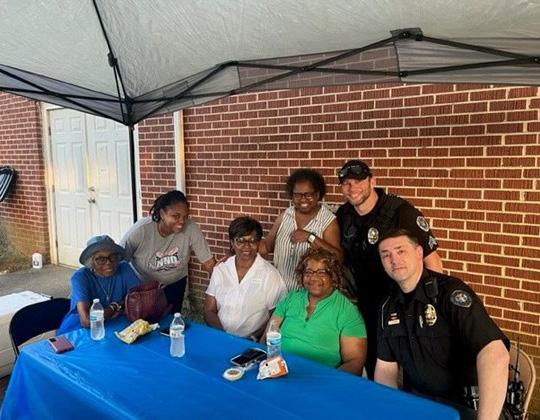
Police officers and community members engaging in conversation during a community event.







Community members participate in a discussion during a Photovoice session. a profound impact on community relations. It is a straightforward yet powerful tool that law enforcement can use to engage in ongoing dialogue and build lasting relationships.
This transformative journey was made possible through our collaboration with Essential Partners, an organization that specializes in fostering dialogue and understanding within communities. Their expertise in implementing Photovoice was instrumental in reshaping how we approach community relations, demonstrating the value of external partnerships in driving positive change.
As the Police Chief of Mebane, my team and I are committed
to integrating Photovoice into our strategic plan. We see it as a unique opportunity to reshape our interactions with the public, promoting active listening, empathy, and adaptability to our community’s evolving needs.
For example, Photovoice can be integrated into community outreach programs, particularly in neighborhoods where trust in law enforcement may be strained. Officers can collaborate with local youth organizations, encouraging participants to document their experiences through photography. These images then become the basis for structured dialogues between the community and law enforcement, providing a platform for voices that are often unheard.
Since incorporating Photovoice into our community engagement strategies, the Mebane Police Department has observed
a noticeable increase in positive interactions between officers and community members.
Preliminary feedback indicates a significant improvement in public perception of the department’s responsiveness and a reduction in reported incidents of community tensions.
As law enforcement continues to navigate the complexities of modern society, tools like Photovoice offer us a unique opportunity to evolve.
By integrating such methods, we not only preserve the trust and safety of our communities but also ensure that we, as leaders, are at the forefront of positive change in policing.
I encourage my fellow police leaders to consider the power of Photovoice in reshaping our pro-






fession.
By embracing this innovative tool, we can transform our relationships with the public, fostering an environment of mutual respect and understanding.
To get started, consider reaching out to Essential Partners or attending one of their workshops to see firsthand how Photovoice can revolutionize your department’s approach to community policing.
For those interested in delving deeper into the use of Photovoice in law enforcement and community engagement, I recommend exploring the work of pioneers in the field, Caroline Wang and Mary Ann Burris.
Their extensive research provides valuable insights into this methodology and its applications in various contexts, including policing.
Photovoice is more than just a tool; it is a catalyst for change in modern policing. Join us in embracing this transformation and revolutionizing how we connect with our communities.
Please feel free to reach out to me if you have any questions.
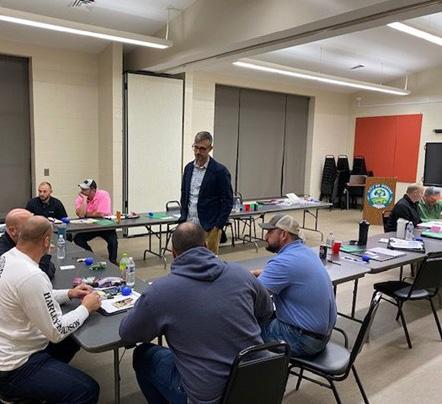























by Major Allan Rutledge (Ret.) National Law Enforcement Liaison, Security Industry Alarm Coalition (SIAC)
Law enforcement agencies across the country, including North Carolina are experiencing unprecedented challenges when it comes to the hiring and retention of police officers.
The hiring and retention struggles, coupled with consistent population growth throughout the state challenges police departments to meet the needs of the community. Alarm calls for service are often one of the top three call types in which police departments respond, many of which are false alarms.
The reality is that alarm calls are generated by a small portion of the community that utilize alarm systems as an effective crime prevention tool, offering a sense of security. There have been significant technological advances over the years and studies have shown that virtually all false alarms are attributable to user error by a small percentage of alarm users.
An effective way to reduce the number of alarm calls for service is to adopt and implement an Alarm Ordinance. The Security Industry Alarm Coalition (SIAC) has worked in conjunction with the NCACP to develop a Model Alarm Ordinance.
The premise of the Model Alarm Ordinance is to hold the small percentage of alarm users that contribute to false alarm issues, wasting limited police resources, accountable through alarm registration and false alarm fines. Every community is
unique, so the model ordinance may be modified to meet the needs and tolerances of the community.
Some critical components of an effective Alarm Ordinance are: Annual registration of all alarm systems; Limited number of free responses to one or two per year; Escalating civil fine structure; Suspended police response to those that don’t pay alarm fines or are chronic false alarm issues; And an effective appeal process.
A recent study conducted by Dr. Joe Kuhns of UNCC concluded that jurisdictions that adopted and enforced the Model Alarm Ordinance demonstrated sustained false alarm reductions.
The North Carolina Model Alarm Ordinance was developed by and is periodically reviewed by members of the NCACP Alarm Management Committee, which consists of three police chiefs who are appointed by the association president, three alarm industry professionals within the state, and a SIAC representative.
The NCACP Alarm Management Committee was established in 2009, with the goal of developing sustained partnerships between law enforcement and the alarm industry, reducing false alarm dispatches and addressing other alarm related issues.
In describing the work of the NCACP Alarm Management Committee, Tommy Whisnant of CPI Security and the North Carolina Security and Low Voltage Association, stated, “The committee has been and continues to be a great opportunity for the alarm industry to collaborate with North Carolina’s police chiefs on alarm management issues”.
SIAC’s objective is to develop and foster collaborative partnerships between law enforcement and the alarm industry and serves as a resource for alarm management strategies.
SIAC is a non-profit 501 (c) (6) organization comprised of retired law enforcement executives and alarm industry professionals. According to Stan Martin, SIAC’s Executive Director, “The primary mission of SIAC is to work with local and state law enforcement agencies and the alarm industry in finding viable solutions to alarm management issues … and we are very pleased with the continued partnership with the NCACP and the alarm industry.”
SIAC does not sell any products and all services are free of charge to law enforcement. For additional information on the NCACP Alarm Management Committee or other alarm management issues, contact Allan Rutledge at allanr.siac@gmail. com or at 704-614-0050. Allan is the SIAC National Law Enforcement Liaison for North Carolina. For additional information, you may also visit www.siacinc.org.




































by Roxboro Police Chief David Hess
The North Carolina Association of Chiefs of Police reached a milestone training future police chiefs. As part of a pilot program in 2018, the Police Chiefs Institute graduated over 200 future police chiefs.
The training program was born from the Associations Strategic Plan in 2017 that established several goals over the course of five years. In partnership with the North Carolina Justice Academy, the following year the Association hosted a 24-hour pilot for the course during the annual conference.
Twenty-five newly appointed police chiefs or assistant chiefs attended the pilot course that included an introduction to a variety of needs including media management, fiscal management, and public record law.
Based on student feedback, the curriculum expanded the following year adding personnel law and ethics. By the summer of 2019, the course expanded into a 40-hour curriculum hosted twice a year. The spring course is offered at the Salemburg campus of the Justice Academy and the fall course is offered at the Edneyville campus.
This esteemed institution provides an intensive and comprehensive program designed to equip current and aspiring police chiefs with the skills needed to lead with integrity, efficiency, and foresight. The Police Chiefs Institute is known for its rigorous curriculum, which is meticulously crafted to address the multifaceted challenges faced by
law enforcement leaders today. The program covers a wide range of critical areas, ensuring that graduates are well-prepared to handle the complexities of their roles.
At the core of the program is leadership training, which is designed to cultivate the ability to inspire and guide agencies through the increasingly complex landscape of modern policing.
Students are taught to make sound decisions under pressure, to lead with ethical integrity, and to foster a culture of accountability within their departments. To accomplish this vital topic, the Association partners with Virtual Academy, Dolan Consulting, and Equal Librium Up, to provide practical application of modern policing leadership.
The students then experience two separate panel forums learning from existing police chiefs and city/town managers about the complexities of organizational leadership and common challenges leaders face in modern policing.
In today’s digital age, the ability to manage media relations is a vital skill for law enforcement leaders. The Institute provides indepth training on how to communicate effectively with the public and media, manage crises, and navigate the intricacies of social media.
This training ensures that graduates can protect the integrity of their departments while maintaining public trust. Students participate in on-camera scenario
based role play to hone their media skills.
The addition of this course is preparing law enforcement leaders to manage crisis effectively in their community to control the narrative allowing the agency to build trust and legitimacy.
Effective management of financial resources is another cornerstone of the curriculum. Students learn to develop and oversee budgets, manage public funds responsibly, and ensure that their department operates within financial constraints without compromising on the quality of service. This training is essential for maintaining transparency and efficiency in law enforcement agencies.
Understanding the legal frameworks that govern personnel management is critical for any leader. The Institute offers comprehensive education on employment law, labor relations, and the legal aspects of managing staff. This knowledge empowers graduates to handle personnel issues with confidence and within the bounds of the law. The Association felt it important to partner with the North Carolina Education and Training Standards Division to enhance portions of this course by providing students an in-depth understanding of procedural and investigative processes of the Division that impact the law enforcement profession. Facilitated by the Division’s Director and key staff members, this course is aiding in the profession’s understanding of resources from the Division and the importance of










proper hiring background investigations and ethical policing.
One of the most valuable aspects of the Police Chiefs Institute is the opportunity for students to build a robust network of peers and mentors. Through collaborative projects, and scheduled student breakout sessions, students form lasting professional relationships that provide support and guidance throughout their careers.
These vital peer networks enhance the profession by having statewide relationships law enforcement professionals can leverage to aid them with the complexities of modern policing.
The impact of the Police Chiefs Institute extends far beyond the classroom. Graduates leave the program equipped not only with the knowledge and skills they need to succeed but also with a renewed commitment to serving their communities with integrity and excellence.
As these new leaders step into their roles, they bring with them the tools to effect positive change, improve community relations, and enhance the overall effectiveness of law enforcement.
These graduates now join the ranks of alumni who are making a difference in communities across the country.
About the Author:
Roxboro Police Chief David Hess is a past president of the North Carolina Association of Chiefs of Police. He serves in a variety of leadership roles for the Association including serving as Chairperson for the Community Policing committee of the International Association of Chiefs of Police and as a Commissioner on the North Carolina Criminal Justice Education and Training Standards Commission.
Chief Hess holds a Master’s degree in Executive Leadership from Liberty University and is a graduate of the 264th Session of the FBI National Academy.

























by Chief Ken Klamar
I am one of several applicants for a job that I have had my eye on for quite some time. I took the time to ensure that my resume was polished, included all relevant training and experience, and chronologically detailed my work and educational history.
But is it enough? What do the other applicants have that I am lacking? Is there anything that my packet is missing that I should have obtained years ago? Is there anything I can do about this now as I submit this packet for consideration for my dream job?
What makes you stand out? This is a question I have asked myself several times over my career, and I have used this question when screening applicants for employment or promotion within my organization.
Minimum requirements are just that, minimum. If you want to be a minimum employee and put in minimal work, you can expect, well, minimum results. However, if you want to excel and stand out, the power is in your hands to make it happen.
Screening applications usually starts with a process of determining minimum qualifications. If an applicant does not meet minimum requirements, the process for that applicant ends upon initial screening.
Next, applications are often separated based upon experience, training, and education. Imagine, if you will, sorting a stack of 100 applications for two positions.
You divide the pile into four groups: high school diplomas, Bachelor’s degrees, Master’s degrees, and Doctorate’s. Which pile is the biggest? Conversely, which stack
is the smallest? If you want to stand out, if you want to excel in your craft, higher education is one way you can do so.
The benefit of higher education is it doesn’t expire. It does not need to be renewed each year, unlike other professional certificates. Once you obtain it, it cannot be taken away.
Adult learning can be intimidating and downright scary. If you have not been in a formal classroom environment for some time, it can be an adjustment.
However, online learning has become increasingly popular, and there are many accredited universities that offer distance learning. Many online learning programs offer a work-at-your-own-pace schedule that can accommodate a working police officer’s schedule. Finding a rhythm to balance home, work, and school will take time, but the coursework is flexible enough to find a balance.
Financial aid is readily available for working adults, and there is no distinction between seated and online learning regarding financial assistance.
Many agencies offer tuition reimbursement or other pay incentives upon completion. The actual value of obtaining your degree is in the benefit of the credential.
When I was teaching in basic police academies, I told police cadets to line up, shoulder to shoulder, and take one step forward if they have a diploma or GED. Take another step if they have an Associate’s Degree. Take yet another step if they have a four-year degree; you see where I’m going with this.
Your degree will make you stand out from the rest. You will recognize the value when it comes time for promotion or when transferring to
another agency.
Furthermore, what does life hold for you in retirement? If you’re like me and want to keep working postretirement, your degree can open doors for you that a 25 or 30-year career in law enforcement might not.
Invest in yourself, invest in your future. Higher education in law enforcement is becoming the norm and, in many places, it is required to be promoted. Sure, you can have a rewarding 25 or 30-year career without it, but if you want to promote, transfer, or get that dream job, make yourself stand out. The only thing stopping you is you.

the author: Ken Klamar is the Chief of Police for the Town of Sunset Beach in North Carolina. Chief Klamar is also an adjunct professor for Columbia Southern University.






























The Recycling Association of North Carolina is a professional trade association that helps educate and train its members on current laws and best practices pertaining to metals recycling. It also serves as a liaison between its members, law enforcement, and legislators, to promote open lines of communication.
Through their work with Bill Hollingsed, Executive Director of the NC Association of Chiefs of Police and previous Executive Director George Erwin (ret.), RANC Board Members discovered an opportunity to support to the men and women who serve our great state.
Founded on principles of solidarity and service, the RANC Officers Assistance Fund aims to alleviate financial burdens faced by officers and their families during times of crisis or unexpected hardship.
Established in 2014, the RANC Officers Assistance Fund was born out of a collective desire within the metals recycling industry to give back to those who protect and serve. The Fund operates with the mission to provide financial assistance to law enforcement officers in North Carolina who are facing significant medical expenses, catastrophic events, or other financial crises.
“The ability to provide some financial assistance to an Officer or their family during one of, if not the most difficult time in their lives is something we just felt compelled to do. We view it as a privilege to help in a small way.”- Rob Jordan RANC Board Member
The Fund operates with trans-
parency, ensuring that 100% of donations directly benefit the officers and families in need. Through partnerships with RANC members, recycling companies, and vendors, the Fund has grown to become a cornerstone of support within the law enforcement community.
The RANC Officers Assistance Fund relies on the generosity of its members to continue their mission. During the RANC 2023 Annual Meeting, the association raised over $15,000 in pledges from RANC members and their firms.
In January 2024 the NCACP awarded RANC the 2023 Outstanding Partnership Award.
“To be able to accept the award on behalf of RANC was one of the top honors and highlights of my career. Knowing that we have been able to help these families in some small way is something we can all feel good about.” -Rob Jordan RANC Board Member
To learn more about the Recycling Association of North Carolina Officers Assistance Fund and how you can get involved, visit their website at www.ncrecyclingassociation.org.
Together, we can ensure that our law enforcement officers receive the support and recognition they deserve for
their unwavering commitment to our safety and well-being.
The Recycling Association of NC (RANC) serves as the statewide nonprofit trade association for those involved in the metals recycling industry in North Carolina.
The association, which features both public and private businesses, includes scrap recyclers, equipment vendors, and service providers.
RANC aims to provide a means of communication between the association and all other groups interested in or affected by the metals recycling industry.
In addition, RANC hopes to promote closer cooperation, goodwill, and friendly interaction between its members.
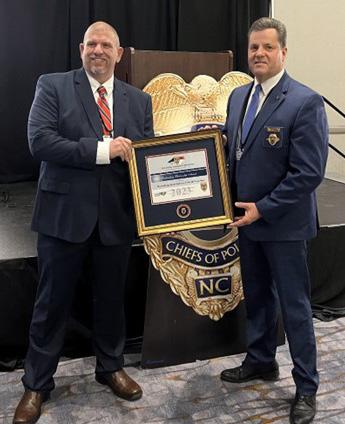





























Representatives from Regions 3 and 4 met at the Charlotte
16, 2024.









Representatives from Region 7 met at the Raleigh City Club April 30, 2024.

Representatives from Regions 9 and 10 gathered in Manteo for a meeting April 2, 2024.

















by Karen Ashley NCLEA Program Manager
The North Carolina Law Enforcement Accreditation (NCLEA) program has been up and running for one year, after the 1st Edition Standards Manual was approved by both Commissions in the summer of 2023.
We have over sixty (60) law enforcement agencies that have submitted their application for enrollment thus far, and most of these agencies are now in the self-assessment phase of the program.
The self-assessment phase of the NCLEA program may take many law enforcement agencies up to twenty-four (24) months to complete.
Agencies must demonstrate compliance with their written directives and proofs with NCLEA’s 116 standards, which outline best practices in critical functional areas such as property and evidence, recruitment and selection, internal affairs, and the use of force.
Copies of the NCLEA Standards Manual and Program Guide are available on the NCLEA
webpage for immediate download. There is no cost for the documents and there is no cost for the program.
The NCDOJ received a federal DOJ COPS Office grant to provide assistance to small and rural law enforcement agencies seeking accreditation. This funding has allowed veteran, experienced law enforcement Accreditation Managers to serve as mentors to agencies seeking accredited status. These mentors are similar to field training officers.

als and can become a phenomenal resource for any agency considering accreditation.
NCLEAN hosts quarterly and annual training conferences and meetings to assist one another to achieve and maintain the best practices in the law enforcement profession.
They provide assistance with policy development, electronic file management, and share lessons learned to guide the agency as they seek accredited status. Over forty (40) agencies are currently being mentored, all funded by this grant.
Agencies interested in accreditation are encouraged to join the North Carolina Law Enforcement Accreditation Network (NCLEAN). NCLEAN members are actively engaged as a collaborative community of profession-


On August 23, 2024, the Black Mountain Police Department was awarded accredited status from the Criminal Justice Education and Training Standards Commission after successfully completing an off-site file review and site-based assessment in March.
Congratulations to Chief Steve Parker, Accreditation Manager Stacy Cox, and the men and women at the Black Mountain Police Department for achieving this award!



Carolina Beach, NC, August 21, 2024 - The Carolina Beach Police Foundation (CBPF) has approved the request for two monetary grants totaling over $10,000 to the Carolina Beach Police Department (CBPD) to ensure its officers have the vital equipment, and programs needed to effectively serve and protect our community.
“This level of support is only possible because of the generous donations of our Carolina Beach residents and businesses. They have made it possible for the CBPF to provide additional financial resources to the CBPD. These grants allow the department to keep pace with the rapidly evolving technology, critical skills, or special needs that cannot be readily provided through public sector funds or due to an emerging need outside of the normal budgetary process, “said Pete Green, President of the Carolina Beach Police Foundation.
The first grant will provide the funding for a 2-day seminar that focuses on CBPD Officer health and wellness through a

comprehensive program designed to address the challenges of working in Law enforcement and providing proactive strategies for managing the physical, and mental health demands with effective strategies to build resilience and proactive self-care.
The second grant will provide funding for to expand and upgrade the CBPD existing drone unit capabilities. Drones are used to provide a safe and effective way to navigate and obtain information in high-risk indoor escalating situations as well as for use during incidents on the beach or at Freeman Park and assisting with life saving measures.

“Since its recent inception, the Carolina Beach Police Foundation has worked tirelessly to support our agency. The ability to have opportunities to apply for grant funding for critical items not normally included in our budget allows us to expand our focus on officer wellness, training, and equipment. In addition to benefitting every member of our agency, the enhanced support provided by the CBPF truly serves to improve our services to the entire community.
We are very appreciative of the CBPF and thank them for assisting us on our mission to provide outstanding public safety services to our citizens and visitors to Carolina Beach.” Said Chief Vic Ward, of the Carolina Beach Police Department.
The CBPF Board of Directors will present a check to the CBPD on August 27 at 1030 AM at the Carolina Beach Town Hall. About the Carolina Beach Police Foundation
The Carolina Beach Police Foundation is a fully independent, non-profit 501(c)(3) organization, with a volunteer Executive Committee and Board of Directors, whose mission is focused on supporting the Carolina Police Department, its Officers, and their families.
To learn more, or to consider volunteering or donating to the foundation, please can go to our website at https://carolinabeachpolicefoundation.org or send an email to information@carolinabeachpolicefoundation.org.




by Chief (Ret.) Robert Temme Assistant Professor State University of New York
Have you ever lost sleep wondering what may, or may not, be happening in your property room? If the answer is yes, you are not alone.
Law Enforcement Chief Executive Officers spend very little time in the Property and Evidence Room and believe they are best served by not having their name appear on the secure area sign in log. Unfortunately, instances of misfeasance, malfeasance and criminal activity can be found in news stories across the country.
A simple internet search of “Firing Police Chief” in your favorite search engine will result in a return of numerous uninterrupted pages in response to such a query. Paying
closer attention to what is occurring, or not occurring, in your Property and Evidence Division is a proactive way to protect the integrity of criminal investigations, your agency’s reputation and reduce your possibility of termination, becoming yet another search engine return.
If you are an accredited law enforcement agency by the Commission on Accreditation for Law Enforcement Agencies (CALEA) or awarded accreditation by a state accreditation program, you are more than likely well aware with the best practices when it comes to managing a Property and Evidence Division.
However, accrediting agencies do not dictate “how” to conduct audits and inspections of property rooms, but rather they simple indicate that audits and inspections should occur along with specific intervals and
in certain instances the quantity of items to be audited.
More often than not, these audits occur involving the in-custody property of the evidence storage system.
Even the CALEA compliance standard statement focused on property and evidence control audits and inspection reports references “… evidentiary integrity over agency controlled property and evidence…” Therein lies the problem, property or evidence that is no longer in control of a law enforcement agency should additionally be audited.
No matter what process an agency chooses to select items for an audit, whether it be for an annual audit, semiannual audit, unannounced audit or a change of evidence custodian audit, the methodology for the selection of items to be audited should be
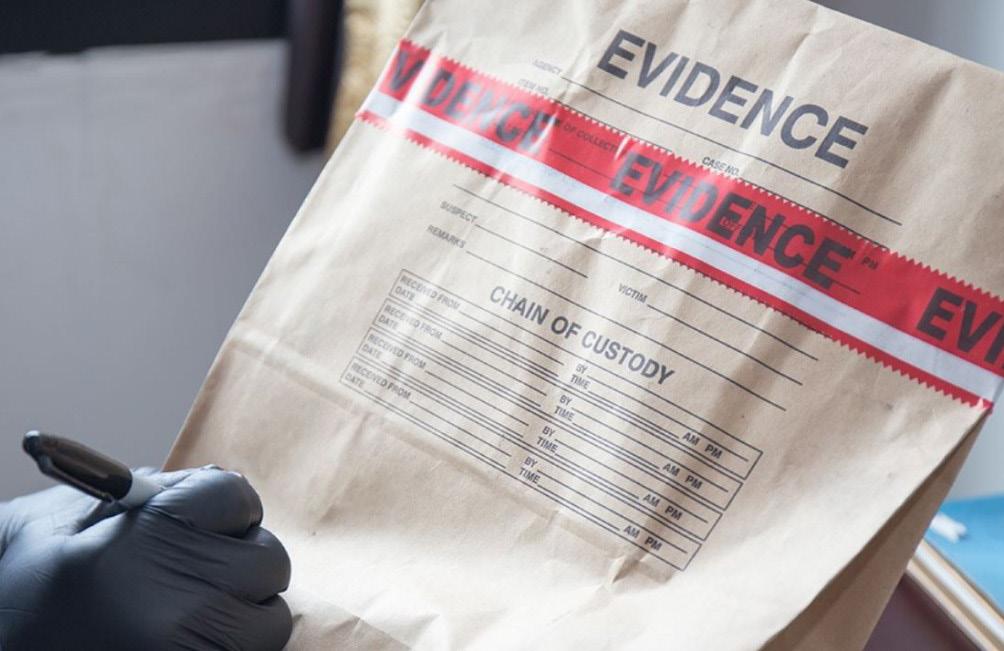
(917) 601-9058
2103 Pyramid Village Blvd Greensboro

Celebrate Your Senses
Super China Buffet has been nestled in Greensboro ever since 2007. This cozy establishment highlights our passion for market-fresh ingredients, honest cooking, and an enjoyable atmosphere. Our menu features a wide selection of dishes made in-house by our team of talented chefs.
Our buffet offers a smorgasbord of fresh and delicious Chinese cooking, including seafood, chicken, beef, pork, and vegetables. With some of the most delicious combinations of ingredients, there is something for everyone to enjoy. Our staff works tirelessly to ensure the freshness of the buffet food.
Come dine with us today. superchinabuffetnc.com

clearly articulated in your agency’s written directives.
These written directives will provide needed guidance to those conducting the audit.
The focal points of the selection methodology should include items across all disposition fields of your property and evidence software, to specifically include items no longer in the custody, care and control of your property and evidence function that have a final disposition entered in the records management system.
These dispositions include, but are not limited to, property turned over for agency use, retuned to the owner, released to another agency, destroyed or ordered by a court to be sold or traded, etc.
Once items of property or evidence that records indicate are no longer in control of your agency appears on the audit list, a reasonable effort should be made to ensure that the final disposition is accurate and actually occurred with all required documentation available creating an “audit trail.”
For example, if an item to be audited reflects a disposition that indicates that item was returned to its owner, an effort must be made to confirm that such an action actually occurred, and all the associated paperwork is available and was completed correctly for this final disposition.
Unfortunately, instances have occurred where an employee entered a final disposition so the agency records represented an item was no longer in the custody of the agency and it was then criminally diverted to the employee for their own personal use.
One such instance was found in which an agency had a policy in place that required property returned
to its rightful owner required that a copy of the owner’s identification be attached to a property release form which the owner affixed his signature acknowledging receipt of the property.
This form was to be included in the audit trail for the returned property. In this instance, several items of found property were turned into the Property and Evidence Division, one of which was a valid drivers license for the owner of the property.
The appropriate agency form was completed by an employee reflecting that the items were returned to the owner. The employee affixed the owner’s signature to this form and attached a photocopy of the drivers license that was turned in along with the other items of property as proof of identification.
A simple phone call to the owner of the property to confirm that the
property was returned quickly exposed the crime that was committed. Had the audit phone call determined that all was in order and the property in question was appropriately returned, the opportunity presented itself to engage in positive community relations and elicit public support.
The common thought process of audits being problematic, irrelevant, unnecessary and a waste of time by an auditor will produce an audit report that is useless to the agency and the CEO.
Property and evidence audits should be time consuming for them to be thorough and useful. It should not be unusual for smaller quantity audits to take an entire day or an annual audit to span over several days.
More often than not, most agencies that assign an employee from the agency to conduct an audit find





that these employees attempt to expedite the process so they can return to their preferred assignment.
Law Enforcement agencies should consider properly vetted employees from surrounding jurisdictions or professional law enforcement associations such as the F.B.I. National Academy Associates, Accreditation Networks, Chiefs of Police Associations, Property and Evidence Associations, etc. making sure to reciprocate when requested.
Training of those doing the audit along with guidance by others outside of the property function is necessary to consistently produce a final audit product that achieves the desired results.
The audits may also identify staffing deficiencies, needed policy changes, equipment needs and other areas of needed potential improvement.
Inspections of a property room are much more informal and less
time consuming task. Inspections of evidence areas are more focused on cleanliness, orderly operations, security measures being followed, etc.
In conclusion, as you have seen here, it is clear that comprehensive property and evidence audits are necessary to ensure the integrity of the property function of your agency.
The old adage of “what is measured can be improved” falls squarely into the audit process. There are some clear benefits to properly conducting audits to specifically include items in the audit that have final dispositions that reflect they are no longer in the custody care and control of your agency.
Selecting the correct individual(s) to conduct property and evidence audits will benefit the agency exponentially and serve to keep the agency out of the news cycle and its CEO gainfully employed.
1 Commission of Accreditation for Law Enforcement Agencies: Standards Manual (Version 6.20, 2024)
2Peter F. Drucker, The Effective Executive: The Definitive Guide to Getting the Right Things Done (2006)

























































































by Eddie M. Buffaloe, Jr., Secretary of the North Carolina Department of Public Safety
As violence continues to be a critical issue in communities across the nation, North Carolina has taken a significant step forward in addressing this challenge through the establishment of the Office of Violence Prevention (OVP).
Created by Executive Order 279 under Governor Roy Cooper, the OVP is the first statewide office of its kind in the South, dedicated to reducing violence and firearm misuse. This article explores the mission, strategies, and impact of the OVP, and how it is making a difference in jurisdictions across North Carolina. A New Approach to Violence Prevention
The mission of the OVP is clear: to reduce harm from violence and the misuse of firearms across North Carolina. This mission is rooted in a vision of a state where all communities have the tools, resources, and expertise needed to ensure safety and wellbeing.
What sets the OVP apart is its approach—leveraging a public health framework to foster collaboration across sectors and support local communities in deploying evidence-based programs and strategies.
A crucial element of this strategy is the partnership between public safety and public health, where law enforcement plays a pivotal role. The OVP recognizes that law enforcement agencies are essential partners in violence prevention efforts.

By working closely with law enforcement, the OVP aims to build a comprehensive approach that not only addresses the immediate aspects of violence but also tackles its root causes. This partnership is vital for creating sustainable, long-term solutions that protect communities and prevent violence before it occurs.
Since its inception, the OVP has focused on four primary functions that are essential to its mission:
1. Collaboration: The OVP works with a wide range of local, state, and national entities to enhance collective efforts in violence prevention. This “whole of community” approach ensures that all relevant stakeholders are involved and aligned in their efforts to reduce violence.
2. Connection: A key role of the OVP is to connect entities engaged in violence prevention with the resources, information, and subject matter experts they need to be effective. By serving as a central hub for these connections, the OVP helps to ensure
that communities across North Carolina have access to the latest knowledge and best practices.
3. Convening: The OVP provides opportunities for peer-to-peer learning and community collaboration through various networking events and forums. These convening efforts are crucial for fostering relationships and sharing insights that can drive effective violence prevention strategies.
4. Training: Preparing communities to implement evidence-based strategies is another critical function of the OVP. By offering training and technical assistance, the office empowers local leaders and organizations to effectively address and prevent violence, while also building their capacity to measure and improve the impact of their efforts.
The OVP’s efforts are directed towards a broad and diverse audience, including city and county agencies, local violence prevention offices, community-based organizations, health departments, law enforcement agencies, U.S. Attorney’s offices, and hospitals. These entities are on the front lines of violence prevention in their communities, and the OVP provides them with the guidance, direction, and support they need to succeed.
Since its establishment, the OVP has engaged with numerous communities across the state, including high-violence areas like Fayetteville and Durham’s Bull











City United, as well as various Hospital-based Violence Intervention Programs (HVIPs).
This engagement underscores the OVP’s commitment to being a trusted resource for those working to initiate, expand, or improve violence prevention efforts. For law enforcement agencies, the OVP offers a vital partnership that enhances their ability to not only respond to violence but to prevent it from occurring in the first place.
In its first year, the OVP has laid a strong foundation for its work by building relationships with local violence prevention programs, advising communities on new initiatives, disseminating state and national funding opportunities,
and establishing a Community Violence Advisory Board.
This board, composed of representatives from law enforcement, public health, community organizations, and research centers, plays a vital role in guiding the OVP’s strategic direction and expanding its reach.
Looking ahead, the OVP has an ambitious agenda. This fall, the office will release and begin implementing its strategic plan, which will guide its efforts in the coming years.
Additionally, the OVP organized a statewide community violence prevention conference November 19-20, 2024, which brought together stakeholders from across the state to share insights and strategies.
The OVP is also expanding its team with two new grant funded
positions, which will enhance its capacity to provide training and technical assistance around community violence prevention.
These efforts will be complemented by the development of educational resources that will further empower communities to tackle violence effectively.
Law enforcement partners are invited to actively participate in these initiatives, ensuring their perspectives and expertise are integral to the state’s violence prevention efforts.
Despite its early successes, the OVP faces significant challenges, particularly in terms of funding. Currently, the office operates without a dedicated state budget, relying on partnerships
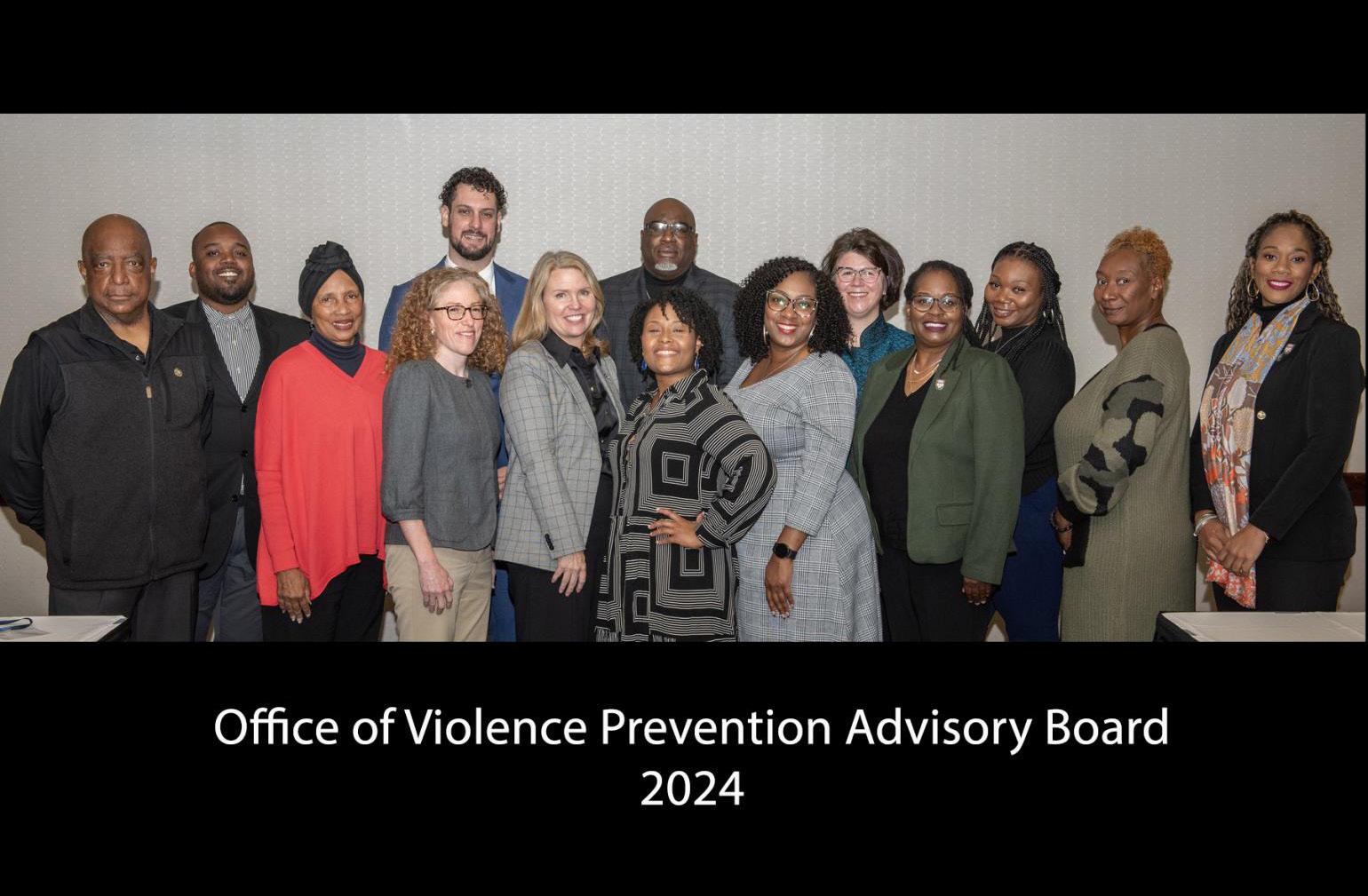








with DHHS and the North Carolina Department of Public Safety (DPS) to sustain its operations.
However, there is a pending special provision request to the General Assembly to make the OVP a permanent office with stable funding, which would allow it to expand its impact even further.
The small staff size has also posed challenges, but the OVP has made the most of its resources by prioritizing its efforts and building strong partnerships.
As the office continues to grow, it will be better positioned to support violence prevention initiatives across the state and ensure that all communities have the tools they need to be safe and resilient.
Law enforcement will continue to be a key ally in this work, and their ongoing partnership is
crucial for the success of these efforts.
The North Carolina Office of Violence Prevention is leading the way in transforming public safety through a collaborative, public health-oriented approach to violence prevention. By connecting, convening, collaborating, and training, the OVP is making a tangible difference in communities across the state.
As the office continues to build on its early successes and overcome challenges, it will play an increasingly important role in ensuring that North Carolina’s communities are safe, healthy, and thriving.
Law enforcement agencies are invited to be active partners in this journey, as their involvement
is essential to creating lasting change.
For more information about the Office of Violence Prevention or to get involved, please contact Acting Director, Siarra Scott at siarra.scott@ncdps.gov or visit https://www.ncdps.gov/aboutdps/current-initiatives/officeviolence-prevention.

We are pleased to offer our readers this easy reference guide to additional businesses. We urge you to patronize these advertisers, as well as those who have purchased display space in this magazine.
A-MARKET
3107 SUMMIT DRIVE
336-392-3284…GREENSBORO
ANGRY GINGER
1202 GUM BRANCH ROAD
910-333-9198…JACKSONVILLE
BURLINGTON FOOD MART
2109 DURHAM STREET
336-227-7050…BURLINGTON
COTTAGE RESTAURANT
6701 N TRYON STREET
704-598-8868…CHARLOTTE
DASA EXPRESS
2809 GROOMTOWN ROAD
336-392-8448…GREENSBORO
DISCOUNT TOBACCO 2825 WENDELL
919-626-0268…WENDELL
DYNASTY CHINESE RESTAURANT 1101 YADKINVILLE ROAD
336-751-3833…MOCKSVILLE
EL REY MINISUPER
2601 S SAUNDERS STREET
919-397-4796…RALEIGH
EL TACO VELOZ
6701 N TRYON
704-701-4619…CHARLOTTE
ESPERANZA SUPERMARKET 6422 SOUTH BLVD
704-733-9138…CHARLOTTE
HARUSAKI 1449 UNIVERSITY DRIVE
336-586-8686…BURLINGTON
JACOB FOOD MART 1425 S. MARIETTA STREET 704-671-4700…GASTONIA
KING WOK DONG INC. 7405 SUNSET LAKE ROAD 919-547-6852…FUQUAY VARINA
LA UAQUERA ESTRELLA 421 CHAPANOKE ROAD, STE 111 919-400-2661…RALEIGH
LIL PIRATES ON BOARD 275 OLD DRUG STORE ROAD 919-661-3098…GARNER
MARGARITA HOUSE & GRILL 1105 BIRDSONG COURT 919-7911894…YOUNGSVILLE
MARTINIZING DRY CLEANER 143 EAST FRANKLIN AVENUE 704-864-9625…GASTONIA
MEXITIME MEXICAN GRILL 4501 SCHOOL HOUSE COMMONS 704-455-6394…HARRISBURG
MR. G’S 450 E 3RD STREET 919-366-0100…WENDELL
MR. TOBACCO & VAPES 1811 NEW HOPE CHUURCH ROAD, STE 113 919-872-4747…RALEIGH
MY NAILS SPA 3278 UNION ROAD 704-852-3030…GASTONIA
PACOS TIRES 284 CABARRUS AVENUE W 704-425-5066…CONDORD
PUPUSERIA TAQUERIA 2808 RANDLEMAN ROAD 336-372-0905…GREENSBORO
QUALITY LATINO TAX 6301 N TRYON STREET, STE 109 704-222-2458…CHARLOTTE
QUICK STOP 4328 CENTRAL 704-733-8170…CHARLOTTE
SINGH FOOD MART 685 CALDWELL DRIVE 601-746-0093…HAZLEHURST
SMOKE HOUSE 427 W. MEADOWVIEW ROAD 336-291-8540…GREENSBORO
THIEN PHU 3023 CENTRAL AVENUE, STE D 704-563-3444…CHARLOTTE
TIDES INN STEAK & SEAFOOD 3927-A WEST GATE CITY BLVD 336-852-5845…GREENSBORO
TORTILERIA ELIZABETH 3134 EASTWAY DRIVE, STE 500 704-529-7700…CHARLOTTE
YUM YUM THAI 861 BASS PRO LANE 919-677-1166…CARY
I n addition to the advertisers who have display and directory space in this issue, these merchants and firms are cooperating to make this
LENOIR
MOXIE MERCANTILE
MY NAILS & SPA
TORTILERIA ELIZABETH
UNITED FOOD MART 3





























































